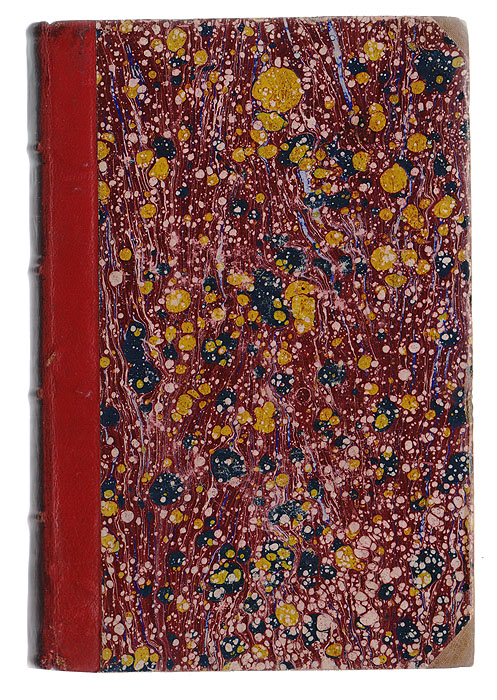Книга: Louis Marie Stanislas Freron «Memoire historique sur la Reaction Royale, et sur les Massacres du Midi»

|
Париж, 1824 год. Издание Baudouin freres, libraires. Владельческий переплет. Бинтовой корешок. Сохранность хорошая. В книгу вошли воспоминания деятеля и активного участника Великой французской революции Луи Мари Станисласа Фрерона. В ходе революции Фрерон был послан комиссаром в итальянскую армию вместе с Баррасом; в октябре 1793 г. оба были командированы на юг Франции, чтобы утвердить там господство конвента. В Лионе Фрерон совершил ряд самых возмутительных неистовств - казнил множество граждан, их имущество конфисковал, с наслаждением устраивал массовые расстрелы, разрушил много зданий; конвент дал ему прозвание "спасителя юга" . Вернувшись в марте 179 4 г. в Париж, он примкнул к Дантону и Демулену, сделался яростным врагом Робеспьера и много содействовал его гибели, как главный вождь вооруженной толпы, напавшей на парижскую думу, и как один из 6 помощников Барраса, которым вверена была военная сила. Фрерон оставался до конца верен революции. Посланный... Издательство: "Baudouin freres, libraires" (1824) Формат: 120x185, 390 стр.
Купить за 16380 руб на Озоне |
Louis-Marie Stanislas Fréron
Louis-Marie Stanislas Fréron (
Background
The son of
author = Greene, Karen
title = The Rise and Fall of a Revolutionary: The Political Career of Louis-Marie Stanislas Fréron, Rerpresentative on Mission and Conventionnel, 1754-1802
date = 2004
url = http://etd.lib.fsu.edu/theses/available/etd-04072004-135325/unrestricted/FrerronDissertation.pdf
format = pdf ]
Early Revolutionary activities
Though due to legal obligations he still had some affiliation with "L'Année littéraire", Fréron took up writing and editing his paper "L'Orateur du Peuple". In it, he wrote radical denunciations of counter-revolutionaries much like those written by
Soon after, he was elected as representative to the
In June 1790, Marcel Enfantin was arrested for "provable conspiracy against liberty" because the authorities believed him to be Martel. In response, Fréron wrote::Citizens, can you believe it? The Orateur du peuple is in chains! He had only taken up the pen in defense of your rights, he was a dynamic writer of the most ardent patriotism…he fought the ministerial hydra with a club, and the aristocracy with ridicule…Well, the Municipality has slandered [his] intentions…it has poisoned his innocent phrases… [but] the voice the Orateur du peuple will pierce the vaults of his prison…the articles of the Rights of Man were made to be used by this French citizen…so that he may publish his opinions.
Also, Fréron's relationship with Desmoulins brought him to the cause of the
author = Greene, Karen
title = The Rise and Fall of a Revolutionary: The Political Career of Louis-Marie Stanislas Fréron, Rerpresentative on Mission and Conventionnel, 1754-1802
date = 2004
url = http://etd.lib.fsu.edu/theses/available/etd-04072004-135325/unrestricted/FrerronDissertation.pdf
format = pdf ]
In September, Fréron was elected to the
Reaction and the Directory
Nonetheless, both he and Barras joined the
He was elected to the
References
Источник: Louis-Marie Stanislas Fréron
Другие книги схожей тематики:
| Автор | Книга | Описание | Год | Цена | Тип книги |
|---|---|---|---|---|---|
| Louis Marie Stanislas Freron | Memoire historique sur la Reaction Royale, et sur les Massacres du Midi | Париж, 1824 год. Издание Baudouin freres, libraires. Владельческий переплет. Бинтовой корешок. Сохранность хорошая. В книгу… — Baudouin freres, libraires, (формат: 120x185, 390 стр.) Подробнее... | 1824 | 16380 | бумажная книга |
См. также в других словарях:
Réaction thermidorienne — Terreur blanche (France) Pour les articles homonymes, voir Terreur blanche. L expression de terreur blanche[1], employée en référence à la Terreur de la Convention montagnarde, désigne les périodes de répression exercées généralement par des… … Wikipédia en Français
Terreur blanche (France) — Pour les articles homonymes, voir Terreur blanche. Compagnies du Soleil lors de la Terreur blanche de 1795. L expression de terreur blanche … Wikipédia en Français
Louis-Marie-Stanislas Fréron — Pour les articles homonymes, voir Fréron. Louis Marie Stanislas Fréron … Wikipédia en Français
Фрерон, Луи-Мари-Станислас — Луи Мари Станислас Фрерон Louis Marie Stanislas Fréron … Википедия
Louis-Marie Stanislas Fréron — Louis Fréron Pour les articles homonymes, voir Fréron. Louis Marie Stanislas Fréron … Wikipédia en Français
Louis-marie stanislas fréron — Louis Fréron Pour les articles homonymes, voir Fréron. Louis Marie Stanislas Fréron … Wikipédia en Français
